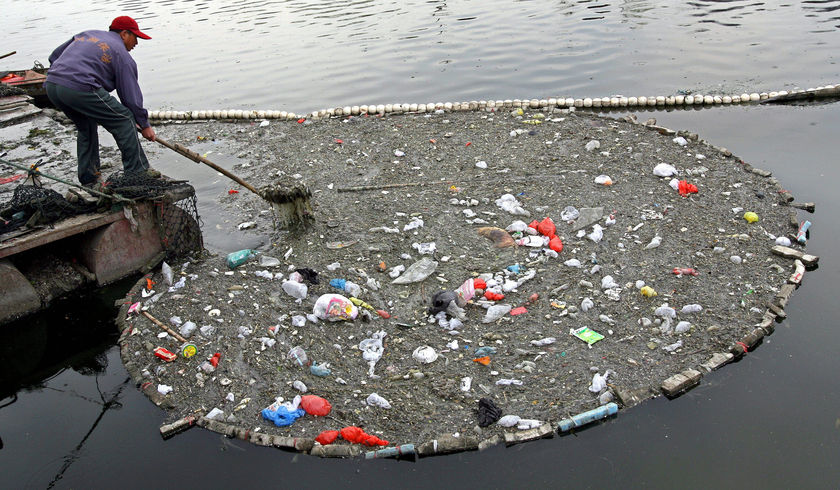Ma Jun: the call of rivers
 |
|
A Chinese workers clears away rubbish from a polluted river in Beijing. [File photo] |
When Ma Jun stood on the banks of the mighty and yet polluted Yangtze River in 1994, he had vague idea that one day he would devote himself to a Mission Impossible: saving China's dying rivers.
Named as one of 100 Most Influential Persons of 2006 by Time magazine, Ma has spared no efforts to raise public participation in environmental protection. Backing him up is a brand-new information platform linking government, businesses and ordinary people.
Born in 1968, Ma often recalls the "good old days" of his childhood by the Jin'gouhe River, or Golden Hook River, a major source of water for Beijing residents. "The water glistened with swarms of fish," he remembers.With his friends, it was where Ma learned to swim.
On summer nights, Ma liked to go out to observe insects in the dim lamplight along the street. "Beijing was much smaller then, and surrounded by undeveloped farmland."
But, the Jin'gouhe River had smelt foul by the late of 1970s when the country's economic reform and opening-up started. And, Ma says, "the water quality of the river was rated Category V, meaning not drinkable, by China's national standards."
"Many rivers in Beijing have lost their functions, except as outlets for waste water discharged by factories or households. Some of them simply dry up, for good. "
By the time Ma Jun graduated from university in 1993 and went to work for a media, his anxiety had been further aggravated by visits to the Yangtze River, the most important lifeline for people living in the south of China, whose ecology was deteriorating.
"The rushing waters reminded me of the poem by Chinese poet Du Fu of the Tang Dynasty -- Falls boundlessly wooden whinny, endless Yangtze River is billowing, but what I saw in the deep of the mountains was rampant deforestation, soil erosion and damage to the environment. The locals said what they owned were just messy patches. "
Nationwide, nearly all China's rivers and lakes were suffering growing pollution. Take the Dongtinghu for example. Once the country's largest freshwater lake, Dongtinghu had dwindled substantially in volume and area. The Fenhe River in north China's Shanxi Province was threatening local people's health due to heavy industrial pollution.
In the face of water shortages, China's governments investigated different options, but engineering took the upper hand, culminating in the construction of reservoirs and large dams in southwest China and projects to divert river from south to north.
Ma, however, questioned their feasibility, as these measures failed to take into account ecological questions.
"The water issue concerns the formulation and implementation of public policy, and influences the public interest to a great extent. But it was restricted to professional circles and very few people had idea of what it means."
Ma turned his observations into a book named China Water Crisis, which has been compared to Rachel Carson's Silent Spring. This was China's first major book putting its environmental crisis under the microscope.
In the book, Ma analyzed problems with the seven basins in China and expressed his concern: "If the policy-makers do not approach water treatment from the basics of environmental protection and sustainable development, many regions in China will be stricken by water crises in the near future."
His concern is echoed by the reality: more than 60 percent of China's fresh water is contaminated and more than half of major cities fall below the country's modest air quality standards.
Unsatisfied by merely pointing out problems as a journalist, Ma continued thinking about remedies for China's water crisis, further developed during a stay with an international environmental consulting company and tenure as visiting scholar for a year at Yale University.
"I came to realize the power of the market in its disciplining role over the company performance, which might be applied to environmental protection.
 0
0 







Comments